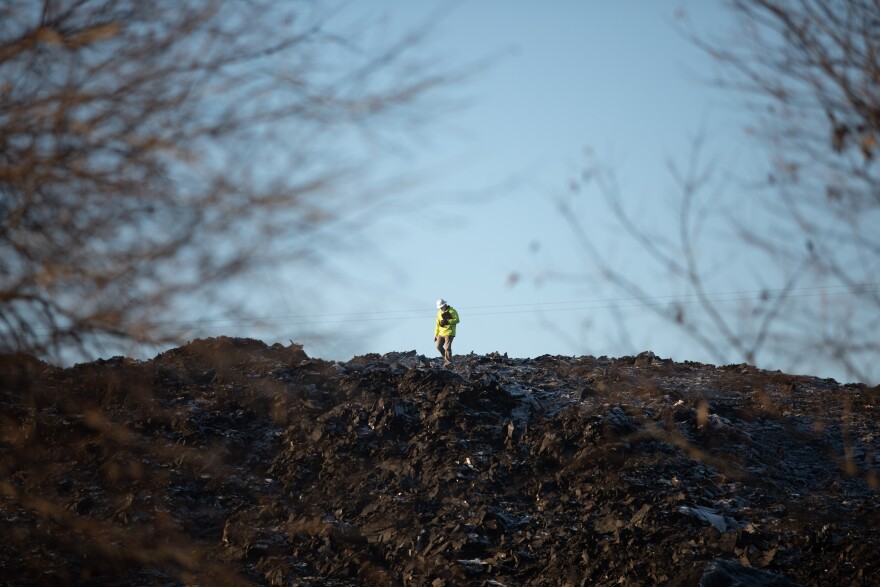After a years-long fight to remove Shingle Mountain, about ten trucks on Thursday morning began to haul away the six-story pile of roofing shingles in southeast Dallas.
City officials say the teardown is expected to be completed by March 2021.
Starting at 8 a.m., large trucks from Roberts Trucking Inc. began to haul shingles away. The crew estimated there were over 100,000 tons of them on site.
"As this project goes on and we make more room inside the site we're going to be adding more trucks — hopefully up to 15 trucks. I'd like to get over here turning everyday with the hopes we can start out on the low end of 200 loads a day. I'd like to get up to 400 if possible," said Quincy Roberts, owner of the trucking company.

Roberts said the work is expected to continue until sunset. The crew will be at location from sunrise to sunset six days a week, until all shingles are completely removed.
City Council Member Tennell Atkins, who represents the area where Shingle Mountain stands, said in a statement that the removal of Shingle Mountain “marks a new era in Southern Dallas.”
He was at the dump site on the cold Thursday morning.
"I think we moved as fast as we could. Once we did find out about it, it took a couple years but we are moving it and are glad we are finally getting this taken care of in the city of Dallas," Atkins said.
Council member Omar Narvaez accompanied Atkins. They both wore construction hats and were in full gear.
"This is a great day. This is cleaning up. I never wish we had to get to this day, meaning this never happened," said Narvaez, who's the chair of Dallas' Environment and Sustainability Committee.
"However, it did and it took us what we had to do to get this done," he said. "And our number one concern is the public safety, the public health and obviously the environment."
The shingles will be sent to McCommas Bluff Landfill, where the materials will be recycled. The site's located across the street and about a five minute drive from Shingle Mountain.

The removal process will be monitored by Modern Geosciences, an environmental advisory group that works in Texas and across the U.S. A Modern Geosciences worker was on site, inspecting the air quality during the removal process to make sure it isn't harmful to local residents.
“One thing we are doing is we make sure it is safe. It got to be environmentally safe. We got a cover. We got monitors inside the facility and outside of the facility that monitor the particles in the air,” Atkins said.

According to council member Narvaez, the creek next to Shingle Mountain has not been contaminated or ‘environmentally damaged in any way.' This was a big concern for the residents of Floral Farms because this creek prevents the neighborhood from flooding.
Narvaez adds that the Environment and Sustainability Committee will have a special Shingle Mountain meeting in January 2021 to talk about, "What happened? How did we get here? What can we do in order to not ever have a Shingle Mountain happen ever again in the city of Dallas?"
In 2018, the company Blue Star Recycling bought the property in southeast Dallas and started dumping hundreds of tons of roofing materials. This continued for almost three years, creating an illegal dump so large it’s visible from South Central Expressway.
Residents have long called for the city to do something about it and activists call it “a poster child for what environmental racism looks like.”
Atkins explains that the removal took a long time because the city was in legal battles with the recycling company.

Next to where the removal is taking place, on Choate Road, resident Marsha Jackson is watching the process.
Previously, Jackson told KERA she's worried about people getting too close to the dump site. She said she’s gotten headaches and has slowly lost her voice because of the shingle material blowing into the wind.
The long-time Floral Farms resident is suing the city of Dallas and blames them for zoning the land next to her home for industrial development.
Jackson — a local advocate and founder of the environmental justice group Southern Sector Rising — said she's careful not to get too excited.
"We can’t get excited until it is all gone," Jackson said. "Just thinking out of almost three years, we’ve been excited and thinking this is going to happen before and it hasn’t happened at all. And once that property is completely cleared over there, next time you come you will probably see tears all down our face."
"We can’t get excited until it is all gone. Just thinking out of almost three years, we’ve been excited and thinking this is going to happen before and it hasn’t happened at all."Marsha Jackson
Instead, she's focused on the city and making sure they allow Roberts Trucking to complete the teardown. Jackson is placing her faith in the company.
Roberts Trucking Inc. is located about three miles from the site. Quincy Roberts said this dump is located in an area he considers home.
"This is something that is personal for me. I really wanted to get over here and clean it up for the community," said Roberts. "I just can’t wait 'til this over to see the smile on her (Marsha Jackson's) face."
Got a tip? Alejandra Martinez is a Report For America corps member and writes about the economic impact of COVID-19 on marginalized communities for KERA News. Email Alejandra at amartinez@kera.org. You can follow Alejandra on Twitter @_martinez_ale.
KERA News is made possible through the generosity of our members. If you find this reporting valuable, consider making a tax-deductible gift today. Thank you.









